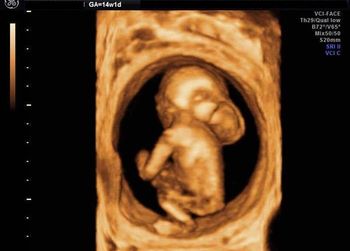
The US Food and Drug Administration (FDA) has approved the Plan B One-Step levonorgestrel pill for emergency contraception (EC) without prescription for women aged 15 and older, although proof of age must be provided at the time of purchase.

The US Food and Drug Administration (FDA) has approved the Plan B One-Step levonorgestrel pill for emergency contraception (EC) without prescription for women aged 15 and older, although proof of age must be provided at the time of purchase.

The American Academy of Pediatrics (AAP) has issued a policy statement that advocates standards of practice for planned home births that are consistent with standards of practice for infants born in medical care facilities.

This surgical video shows resection of a 3-cm intracavity fibroid using minimally invasive surgical technology. The patient, a 40-year-old woman, presented with a 60-day history of abnormal bleeding.

The average ob/gyn might deliver 10 to 15 babies a month over a 30-year career-let’s say 4000 to 5000 in total. Inspire one medical student to enter our field every year by striking up a relationship during his or her clerkship, and you could influence the births of more than 100,000 babies down the road.

In utero exposures to altered maternal nutrition, stress, or environmental toxins may alter organ structure or function, leading to adult obesity.

Medical management of early pregnancy failure is an appropriate and safe option for many women who want to avoid surgical intervention or expectant management.

When it comes to discussing exercise, it seems that many of us are at a loss for words. What kind of exercise should I recommend? How much exercise is enough? How much is too much? How do I know that my patient is actually exercising? How do I prescribe exercise? As you can imagine, there are apps for this!

This difficult defense-a young woman dying shortly after a routine tubal ligation-was further complicated by conflicting reports about who said what to whom and when.

Two physicians discuss the pros and cons of universal assessment for ob/gyns and their patients.



In patients with an American Fertility Society class V or class VI septate uterus, hysteroscopic metroplasty is associated with a significant improvement in reproductive performance.

Using ultrasound imaging before an epidural catheterization or lumbar puncture can reduce the risk of failed or traumatic procedures and can lower the number of needle insertions and redirections, according to the findings of a systematic review and meta-analysis.

A study appearing in the American Journal of Obstetrics & Gynecology may be the first to connect teenaged motherhood with adult obesity. Researchers found that US women who give birth as teenagers are significantly more likely to be overweight or obese later in life than are women who were not teenaged mothers.

Total delivery costs are lower-and rates of vaginal delivery higher-when external cephalic version (ECV) is done with versus without neuraxial anesthesia. So say the results of a study by Stanford University researchers published online in Anesthesia & Analgesia.

A population-based cohort study, the results of which were published online on the website of the Journal of the American Medical Association on April 24, has found that the children of women who used valproate during pregnancy had a higher risk of autism spectrum disorder and childhood autism compared with children of women who did not use valproate.

This patient presented with 18 months of secondary infertility following a second trimester dilation and extraction.

The use of a postoperative levonorgestrel-releasing intrauterine device reduces the recurrence of painful periods in women with endometriosis.

A recent discovery suggests that Trichomonas vaginalis may alter the vaginal microbiota in a manner that cultivates bacteria that is beneficial to its survival and transmissibility.

What is your diagnosis in this fetus of 12 weeks gestational age?

Enhancing cardiotocography with ST analysis in fetal monitoring reduces the incidence of instrumental vaginal delivery and the need for fetal blood sampling.

In a group of diverse hospitals across multiple states, an improvement program substantially and rapidly decreased elective scheduled early-term deliveries to less than 5%.

Nearly 70 issues associated with management of endometriosis are outlined in a first-of-its-kind worldwide consensus statement on the disease released by the World Endometriosis Society (WES) Montpellier Consortium, an international group.

Exposure to anti-tumor necrosis factor (anti-TNF) drugs for rheumatoid arthritis (RA) rather than methotrexate may be associated with increased rates of induced abortion, according to the results of a nested case-control study by Canadian researchers. The findings, say the investigators, point to a need for contraceptive counseling for women being treated for RA to lower the likelihood of unplanned pregnancy.

The FDA has approved Diclegis for the treatment of nausea and vomiting in pregnancy.


Women with endometriosis who undergo surgery to treat the condition are less likely to have ovarian cancer develop later in life.

There is limited evidence that for transcervical chorionic villus sampling (CVS), the use of small forceps may be more effective and less painful than the use of an aspiration cannula.

A mammogram showing an abnormal finding can result in stress and anxiety for as long as 3 years for some women, even if the finding is determined to be a “false positive,” according to a study that appeared in the March/April issue of The Annals of Family Medicine.